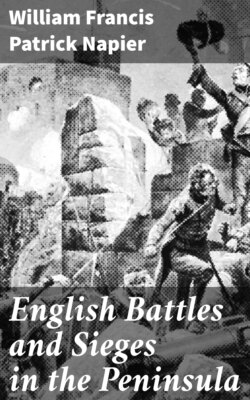Читать книгу English Battles and Sieges in the Peninsula - William Francis Patrick Napier - Страница 30
На сайте Литреса книга снята с продажи.
Evacuation of Almeida. (May, 1811.)
ОглавлениеTable of Contents
Massena retired on the 10th across the Agueda, and was relieved in his command by Marmont. The fate of Almeida was then decided, yet its brave governor, Brennier, who had been exchanged after the battle of Vimiero, carried off the garrison. He had fifteen hundred men and during the battle had skirmished boldly with the blockading force, while loud explosions, supposed to be signals, were frequent in the place. When all hope of succour vanished, a French soldier, named Tillet, penetrated in uniform through the posts of blockade, carrying an order to evacuate the fortress and rejoin the army by Barba de Puerco. Meanwhile the British general, placing the light division in its old position on the Azava with cavalry-posts on the Lower Agueda, had desired Sir William Erskine to send the 4th Regiment to Barba de Puerco, and directed General Alexander Campbell to continue the blockade with the sixth division and Pack’s brigade. Campbell’s dispositions were negligently made and negligently executed. Erskine transmitted no orders to the 4th Regiment, and Brennier resolved to force his way through the blockading troops. An open country and a double line of posts greatly enhanced the difficulty of the enterprise, yet he was resolute not only to cut his own passage but to render the fortress useless. In this view he had mined the principal bastions, and destroyed his guns by a singular expedient, firing several at the same moment with heavy charges but placing the muzzles of all but one against the sides of the others; thus while some shots flew towards the besiegers others destroyed the pieces without attracting notice: these were the explosions supposed to be signals.
At midnight on the 10th he sprung his mines and in a compact column broke through the picquets, passing between the quarters of the reserves with a nicety proving his talent and his coolness. Pack, following with a few men collected on the instant, plied him with a constant fire, yet could not shake or retard his column, which in silence gained the rough country leading upon Barba de Puerco, where it halted just as daylight broke. Pack still pursued, and knowing some English dragoons were a short distance off sent an officer to bring them out upon the French flank, thus occasioning a slight skirmish and consequent delay. The other troops had paid little attention to the explosion of the mines, thinking them a repetition of Brennier’s previous practice, but Pack’s fire had roused them, the 36th Regiment was now close at hand, and the 4th also, having heard the firing, was rapidly gaining the right flank of the enemy. Brennier drove off the cavalry and was again in march, yet the infantry, throwing off their knapsacks, overtook him as he descended the deep chasm of Barba de Puerco and killed or wounded many, taking three hundred, but the 36th Regiment rashly passing the bridge was repulsed with a loss of forty men. Had Erskine given the 4th Regiment its orders, the French column would have been lost, and Lord Wellington, stung by this event, and irritated by previous examples of undisciplined valour, issued this strong rebuke. “The officers of the army may depend upon it that the enemy to whom they are opposed is not less prudent than powerful. Notwithstanding what has been printed in gazettes and newspapers, we have never seen small bodies unsupported successfully opposed to large; nor has the experience of any officer realized the stories which all have read of whole armies being driven by a handful of light infantry and dragoons.”
